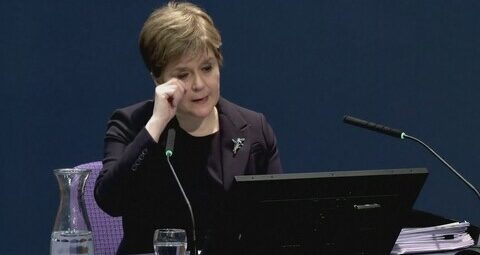Nicola Sturgeon won’t give up her lockdown dogmatism
The former first minister doubled down on her commitment to Zero Covid.


Nicola Sturgeon’s testimony today at the UK Covid inquiry wrapped up three weeks of public hearings in Scotland focused on decision-making and political governance. The former first minister has seen declining popularity in recent months, but it is her Covid legacy that should also come crashing down to earth. Despite consistently claiming that she “made many mistakes” during the pandemic, Sturgeon’s testimony ultimately served to uphold the unquestionable dogmatism of lockdown, and, with it, the illusions of maximum suppression.
Affirming her belief in the (political) power of lockdown, the ex-leader of the Scottish National Party said:
“I was of the view that we needed to move more quickly […] no one can say what impact it would have had on the overall trajectory of the pandemic but of the many regrets I have, probably chief of those is that we didn’t lock down a week or two weeks earlier than we did.”
– NICOLA STURGEON
Alluding to Holyrood’s maximum suppression strategy, inspired by the Zero Covid philosophy, Sturgeon reiterated the Scottish government’s official approach in saying that “there is no such thing as a level of acceptable loss.” Yet Prof. Mark Woolhouse, a leading infectious disease epidemiologist from the University of Edinburgh and an adviser to the UK and Scottish governments, previously told the inquiry that this approach was fundamentally wrong. He argued that there was too much focus on reducing human contact, that bans on outdoor gatherings were unscientific, the lifting of restrictions was slow, disease models were given too much weight in decision-making, and no assessment of the harms of lockdown was ever conducted.
These points were not addressed during Sturgeon’s appearance. In fact, some of the most crucial questions were not even asked. Why did the Government follow policies with such weak evidence? How did it fail to balance infection control with social harms?
Just this week, new studies were published on the harms of Covid policies. A post-pandemic surge in mental health conditions, such as ADHD, means that an estimated one in nine UK children now have a disorder. A second study has estimated that 56,000 more children in the UK are obese due to our collective Covid response panic and could face “lifelong health consequences”. Excess deaths, most likely due to pandemic-related disruptions to medical services and lifestyle changes, also remain elevated in Scotland.
Instead, Sturgeon faced hours of questions about relatively trivial details. This allowed the media to focus on her deleting extensive WhatsApp messaging (despite previous claims that she would keep all communications), use of burner phones (which she denied), and her propensity for tears.
It also sidestepped the reasonableness of closing schools. Though Sturgeon claimed that decisions were made by the Cabinet, school closures were decided after a cabinet meeting by ex-education secretary John Swinney and the then-first minister. This occurred despite epidemiological evidence suggesting it would not slow the spread, which has been supported by some scientific analysis since 2020. Swinney also admitted to ignoring the harms of school closures.
On the topic of Zero Covid, Sturgeon denied that she desired to “drive Covid out of Scotland”, and claimed that she never really believed in it. Rather, she argued that the “phraseology” was meant to highlight the goal of maximum suppression: keeping the virus at the lowest possible level. This was the position of the Scottish government for much of 2020, and continued to influence the country’s response in 2021.
Sturgeon went on to claim that her “fear of being overwhelmed with the scale of the crisis and an overwhelming responsibility” forced her to act strongly. But as Prof. Woolhouse noted, the lack of honest communication about population risk acted as a barrier to discussing more targeted interventions for the most vulnerable. This left aside the important early failing to protect care homes, including discharging 5,000 elderly patients from hospital without testing them (a common issue found around the world). Sturgeon avoided any question about this.
Despite political leaders tying their legacy to the advocacy for lockdown, cracks continue to emerge. These reveal the logical fallacies at the heart of our illiberal and ineffective Covid approaches. Rather than political posturing, we need a firm rebuttal of these Covid myths among wider society. Sadly, however, the inquiry has thus far failed to achieve those aims.
Follow Kevin Bardosh on X (formerly Twitter) @KevinBardosh